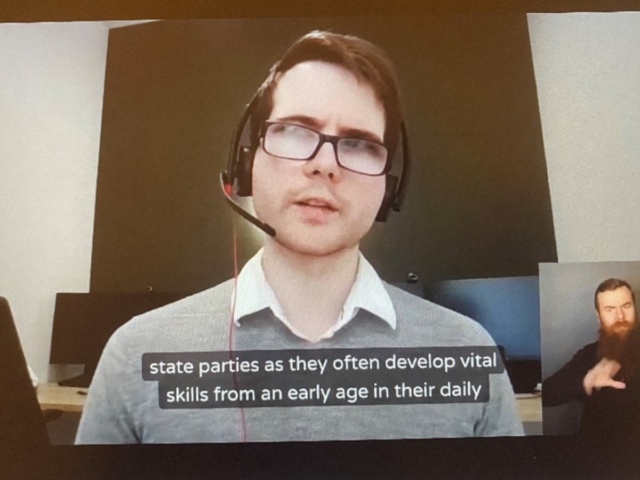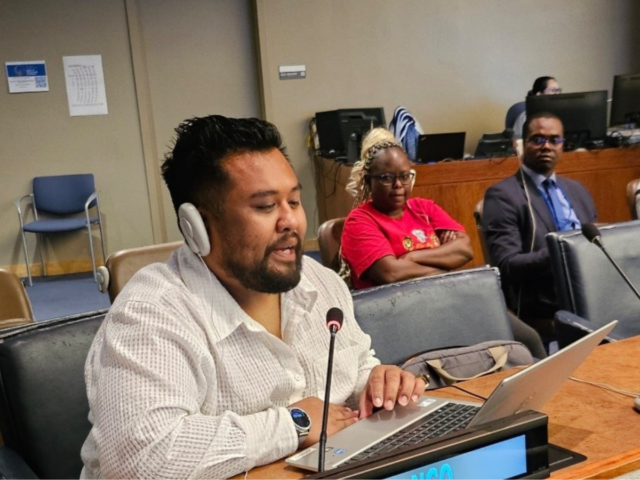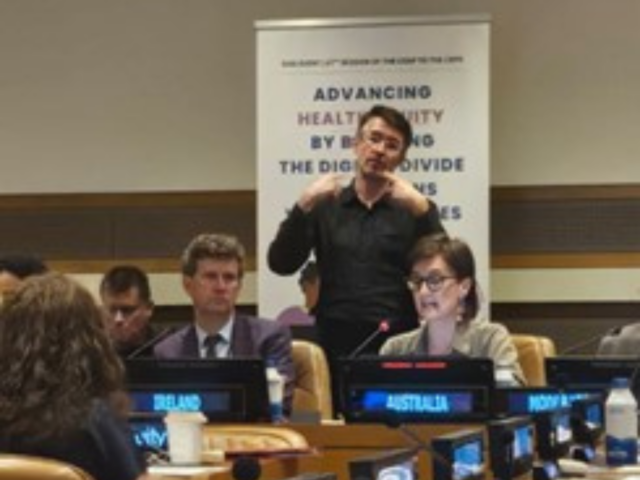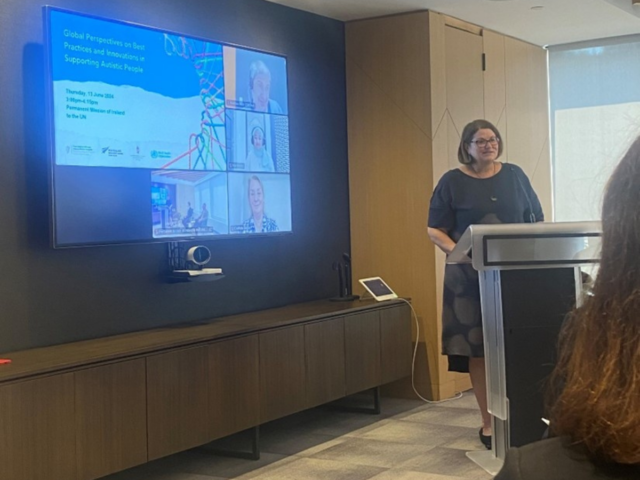13 June 2024
It’s the last official day of COSP17, and PWDA started the day with a bang by presenting its side-event on advancing employment inclusion for LGBTIQA+ people with disability! It was such an important side event being the only dedicated one focusing on LGBTIQA+ people with disability.
The Australian Human Rights Commission’s Specialist Advisor for Sexual Orientation, Gender Identity and Intersex Rights and Immediate Past Disability Chair for the International Lesbian, Gay, Bisexual, Trans and Intersex Association (Oceania), Ruby Mountford set the stage with introductory remarks.
PWDA’s own Giancarlo de Vera, then moderated an illuminating lived experience panel, consisting of four brilliant panellists: Emily Unity (COSP17 delegate from Children and Young People with Disability Australia), Charbel Zada (PWDA), Uncle Paul Calcott (COSP delegate for Queensland Advocacy for Inclusion) and Annabelle Oxley (Queensland Council for LGBTI Health).
The panel’s stories brought to life the multiple barriers LGBTIQA+ people with disability face accessing and maintaining employment. We also heard about the importance of having LGBTQIA+ people with disability in leadership positions, and ensuring that employers go beyond ‘ticking the box’ in creating inclusive workplaces.
To equip employers with practical ways to make workplaces more inclusive for LGBTQIA+ people with disability, the side event then showcased a co-designed and governed toolkit that PWDA and others developed with LGBTIQ+ Health Australia. The EmployableQ toolkit contains a suite of resources to support employers to be more inclusive. The wonderful Alexander Ladd from Caxton Legal Centre then gave the closing remarks, highlighting the importance of letting people bring their full selves to work.

After the side event it was time for PWDA to take the stage again, this time at the last COSP17 roundtable on the right to decent work and sustainable livelihoods. Giancarlo delivered an intervention urging governments and civil society to not leave LGBTQIA+ people with disability behind in employment by upholding the founding UN principles of equality and non-discrimination.

The roundtable also featured panelist Michael Cox from Down Syndrome Australia, who gave a moving speech about his experience working for a large international company that had great inclusion policies but did not make him feel welcome. Michael emphasised that people with intellectual disability need access to open workplaces that properly support employees with intellectual disability.
Following the roundtable, Giancarlo then had bilateral meetings with Women Enabled International and CREA, an international human rights organisation by and for women in the Global South. We shared a common interest in upholding the rights of LGBTQIA+ people with disability and spoke about the different approaches each of our organisation take.
At lunchtime Giancarlo and Lisa then attended a side event about health equity and the digital divide, where we learned that technology doesn’t always make healthcare more accessible for people with disability, and that people with disability are being left behind as technology advances.

In the afternoon Lisa attended a side event on global perspectives on supporting autistic people in society, where she heard about Ireland and New Zealand’s recent Autism strategies – which was very topical in light of PWDA’s recent submission to Australia’s first draft National Autism Strategy.

Meanwhile, Giancarlo held another bilateral meeting with the Philippines National Council on Disability Affairs. Last year, Giancarlo hosted a 16-person delegation from the Philippines Government who came to Australia to learn more about Australia’s social protection programs. Meeting with the Council again at this year’s COSP strengthened ties between us, as we further explored shared interests in guardianship and supported decision-making reform.
Before long, both Lisa and Giancarlo had to attend to their final engagements for COSP17, with Lisa’s final order for the day to represent PWDA at the conference’s closing session while Giancarlo attended the final side event for the year, hosted by the Australian Human Rights Commission, on the Optional Protocol to the CRPD.
The Optional Protocol is a powerful tool for people with disability to access justice, with Australia being particularly experienced using the protocol. Attending the side event was the perfect way to end COSP17 as last year PWDA was invited to Korea to support Korea’s recent ratification of the Optional Protocol, driving home just how much COSP promotes best practice among countries around the world, and fosters international capacity building to implement the CRPD!
It truly has been an amazing week for Giancarlo and Lisa, and they’re both excited to share everything they have learned with everyone at PWDA!
